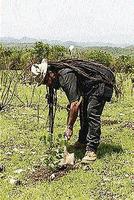Janet Silvera, Senior Gleaner Writer
Farmer Robert Henry, a member of the Trelawny Gun Club, planting one of many trees in the Daniel Town community on Labour Day. - Contributed
WESTERN BUREAU:
The felling of trees on enormous areas of land - to feed the vast appetite for charcoal - in Daniel Town, Trelawny, is of great concern to the Trelawny Gun Club.
The purpose of the club, headed by managing director of Lascelles, and Wray and Nephew, the Honourable William 'Billy' McConnell, is the preservation of wildlife and the sport-shooting of game birds.
As part of the club's Labour Day project, the members, in collaboration with several residents in the community and the Long Pond Sugar Estate, planted 400 saplings in the area, with the hope of reclaiming a fraction of the hundreds of thousands of trees being axed regularly for coal burning.
Lucrative trade
In the past, the making of charcoal was limited to a small group of cutters, who used axes and responded to an internal - and much localised - demand. In those days, many households used coal for cooking. But, since it became a lucrative trade, battery-powered chainsaws have taken the place of axes and are rapidly depleting the woodlands.
Chopping down trees, setting fire to a densely stacked pile of branches and trunks, and covering it with dirt, so that oxygen is limited, thus making charcoal, transforms a process that would otherwise take years to achieve naturally.
"The chainsaw is the preferred tool being used, and not the axe, and this is having a more devastating impact on the community; the absence of the trees is having an adverse effect on the climatic conditions in the area, in particular, the rainfall," stated McConnell.
Checks made with the Jamaican Forestry Department revealed thatthe rate of the deforestation in the country is about one per cent, or 350 hectares per annum.
Director of technical services at the organisation, Alli Morgan, told The Sunday Gleaner that this was bad for such a small island, but with public awareness in the island's schools and the private planting programme aimed at encouraging the planting of trees by residents, he is hoping that the current situation will be alleviated.
Unaware of the conditions in Daniel Town, Morgan, however, cautioned that when trees are cut down, every time it rains, the soil breaks away, causing erosion. "When the trees are covered, the effect of rainfall on the island is minimised and it also helps our water supplies as they act as receptacles allowing the water to seep into the soil," he said.
Importance of topsoil
It is a known fact that without tree roots, topsoil is loosened and easily washed away. Without topsoil, the ground cannot easily absorb water. So, when it rains, water rushes down stripped hills, overflows riverbanks and fills up level lands.
In relation to the burning of coal, he said the method releases carbon dioxide, which was being blamed for global warming. As a result, the Gun Club had already confirmed 1,500 plants for its next project.
Citing the need for public education for the last 15 years, McConnell said he had been appealing to the coal burners over the years to stop cutting down the trees and leaving the soil bare. "I am aware it is their livelihood, all I am asking is that after they cut them down, they must replant them."
A trip into the hinterland of Daniel Town shows deforestation similar to that which greets the eyes when flying over Haiti. With three fourths of Haitians dependent on charcoal to cook their food, and most subsistence farmers unable to earn a living without a quick cash crop, tree cutting is one of Haiti's biggest industries. About 50 million trees are felled to make fuel or to sell as lumber each year, according to the Haitian Environmental Association.
Less thantwo per cent of Haiti's once-lush forests remain, compared with 20 per cent in the Dominican Republic, with which it shares the island of Hispaniola, research has shown.
As coal burning threatens to denude the hills of Daniel Town and its environs, McConnell and his members said they would continue to educate the people through public campaigns.

